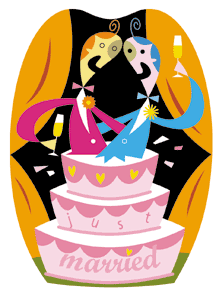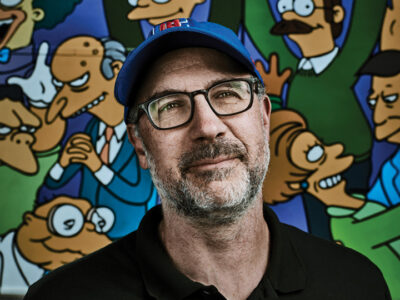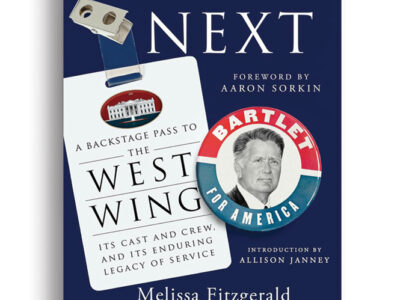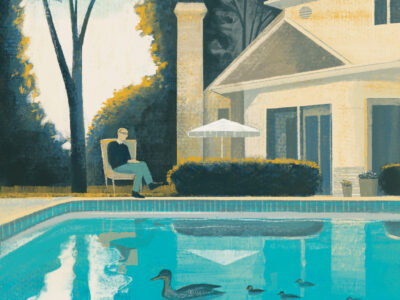
Four couples planning their wedding ceremonies agree to have their experiences taped, and the result is much more than a tulle-wrapped fantasy: We find out what happens when two lovebirds cut Aunt Hilda from the guest list; when another couple worries about how to pay for the reception; and when a groom’s mother refuses to acknowledge her son’s sexuality—or his new union. It’s the real world of Gay Weddings.
Behind the camera is Kirk Marcolina C’92. He is creator and supervising producer of this reality-television mini-series, which premiered on the Bravo cable network in September.
In Gay Weddings two lesbian couples and two gay couples suffer typical pre-wedding angst over floral arrangements and seating charts. But their ceremonies are decidedly atypical: Gay marriages are not recognized legally in the U.S. (although Vermont alone recognizes same-sex civil unions), nor are they widely accepted socially. For the couples in Gay Weddings, walking down the aisle meant making a public pronouncement of their love. For Marcolina, creating the mini-series fulfilled a professional dream and made a simple, powerful statement about gay marriage. “It’s just about love,” he says. “I hope that’s what people take away from this series.”
The subject of same-sex unions has been important to Marcolina since his undergraduate years at Penn, when he was producer and station manager for UTV, the student-run campus channel, and a student leader in the Lesbian Gay Bisexual Alliance. At UTV, Marcolina produced Straight Talk, a lesbian, gay, and bisexual issues talk show. After graduating summa cum laude from Penn, Marcolina earned his MFA in film and video production from the University of Southern California.
A decade later, with critical accolades and a name as an award-winning television editor, Marcolina was asked to develop a gay-themed show to air on Bravo for the television production company Evolution Film & Tape. Among his credits were HIV and AIDS prevention videos for the Centers for Disease Control and Prevention; reality-based series like ProjectGreenlight and HBO Workspace; and three seasons of Bug Juice, a Disney Channel documentary about kids at summer camp, which won an editing award at the Chicago International Film Festival.
Marcolina brainstormed with some friends—including fellow Penn alumni—after dinner one night. A gay dating show? Then came the eureka moment: A show about gay weddings.
Back at Evolution, company president Douglas Ross wasn’t immediately sold. “What I failed to realize [at first] is that when you get married, whether you are gay or straight, a lot comes up—who you are, your relationship with your family, [and that] makes for good television,” Ross says. Add the gay and lesbian element, “and it makes for explosive television.”
The concept was a hit with Bravo. With a tight budget, a small staff, and limited to Southern California in the search for couples, Marcolina worked around the clock for six months; he did everything from budgeting to camera work to editing.
In a style combining reality TV and documentary, viewers meet the couples and go along with them as they select bridal gowns, tuxes, and reception sites—and then have the best seats in the house at the ceremonies. We feel the tension as Scott and Harley bicker over their guest list and then worry as Dale and Eve wonder how they’ll pay for their wedding. We’re disappointed when Sonja and Lupe are rejected at a reception site because they are gay, and we feel heartbroken for Dan when his mother spurns an invitation to his ceremony. In the end we feel jubilant as the couples finally enjoy their weddings—on a beach, in the high desert, in an elegant restaurant, and in a grand outdoor ceremony.
“What Kirk managed to capture is the normalcy of gay relationships,” says Michael Sluchan C’93, a viewer and friend of Marcolina’s since their Penn days. “I think it’s important for the population at large to see that gays and lesbians … want the same things everyone else wants—to share the joyful moments of their life. And I think the show went a long way toward doing that.”
Larry Gross, the Sol Worth Professor of Communication, gives his former student high marks: “One of the standards by which documentarians are measured is their ability to connect with their subjects, let the subjects speak for and be themselves, and on this score Kirk gets a straight A.”
Gross, the author of Up From Invisibility, a book about representations of gays and lesbians in the media, also points out the broader impact of Gay Weddings. “Today our society measures social change by recognizing the movement of individuals and groups across a variety of thresholds: The first African-American this, the first woman that, and increasingly, the first openly lesbian or gay something. In this process of change, the media, and television in particular, both reflect the shifting terms of our public conversation and help to further the very processes they reflect,” Gross says. Shows like this one “help America see and recognize gay people for what they truly are: fellow human beings.”
While conservative groups criticized the series, the show was the highest rated on Bravo last season, and Marcolina just learned in January that it will be renewed for another season.
“My idea for reality-based television is to allow the people in the show to tell the story, let the cinèma verité footage tell the story without too much interview,” he says. The couples were well-spoken and willing to share not only the happy moments, but also some of the struggles.”
As a gay man, Marcolina says, he was able to share some of his experiences with the couples, so they could see his devotion to the project. Born and raised in Philadelphia, he began questioning his sexual orientation in high school. “When I first came to Penn, I was still in the closet. I didn’t want to be gay. I was scared to death to be gay,” he says. “By going to counseling, and by being in a more liberal environment like Penn, I was able to come out and able to accept who I was.” In February Marcolina spoke on campus at a “Freedom to Marry Day” ceremony sponsored by the Lesbian Gay Bisexual Transgender Center.
After producing a show about gay weddings, Marcolina is now planning his own happily-ever-after. He will celebrate his union with the boy next door, Rob Tyler, in a small beach ceremony in Hawaii in August. “He bought the condo next to mine in West Hollywood,” Marcolina says. “He knocked on my door, walked into my life, and hasn’t left since.”
—Jennifer Baldino Bonett




